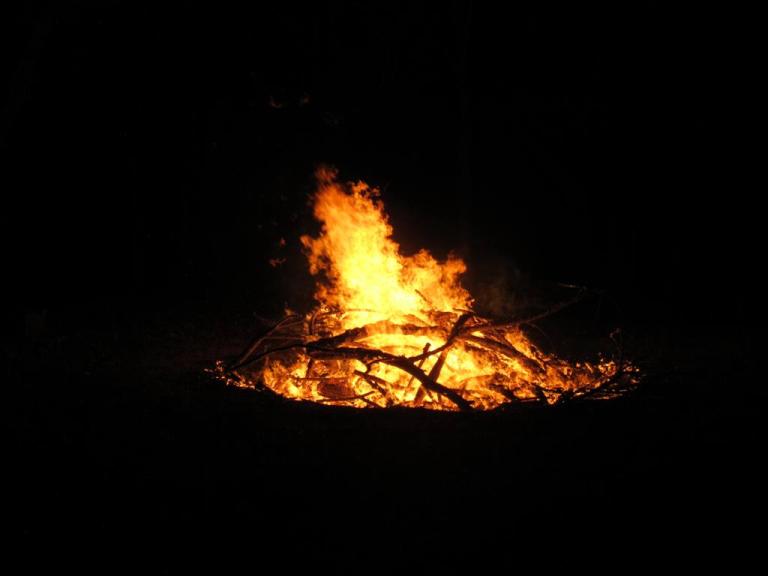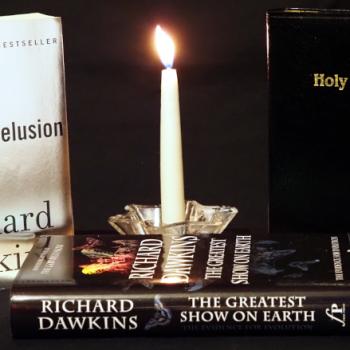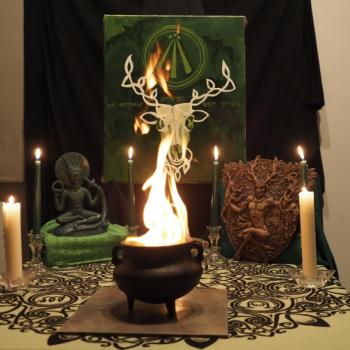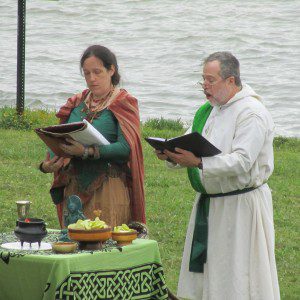 I’m a Druid and a priest. I’m ordained as a priest in the Universal Gnostic Fellowship, and I am sworn as a priest of Cernunnos and a priest of Danu – though not as a priest of Morrigan. But for all my talk of priesthood, I’ve never precisely said what that means. As part of my ordination studies, I wrote a 4200 word essay (as long as three typical blog posts) on what priesthood means to me. That essay is not suitable for posting here (it’s too long and has too many references to other sources in that course of study), but I’ve edited and adapted it for general discussion.
I’m a Druid and a priest. I’m ordained as a priest in the Universal Gnostic Fellowship, and I am sworn as a priest of Cernunnos and a priest of Danu – though not as a priest of Morrigan. But for all my talk of priesthood, I’ve never precisely said what that means. As part of my ordination studies, I wrote a 4200 word essay (as long as three typical blog posts) on what priesthood means to me. That essay is not suitable for posting here (it’s too long and has too many references to other sources in that course of study), but I’ve edited and adapted it for general discussion.
These are my thoughts on priesthood in a modern, Pagan, polytheistic setting. It draws on what we know about ancient priesthoods but it does not attempt to copy the ancients. It uses Christian definitions and concepts for comparison but it is not limited by any of them. I’m presenting this as a starting point for a general discussion on what a Pagan priesthood should be, but I am the only person bound by these ideas – if your Gods tell you to do something different, by all means do so.
A note on gender: while most Pagans generally use “priest” for men and “priestess” for women, some use “priest” for all, and there is little if any difference in qualifications and duties in most traditions. As I will be speaking largely of myself in this discussion, I will mostly use “priest.”
Priesthood is both a role and a relationship. A priest is a servant of a God or Gods, but not all who serve the Gods are priests. A priest has a clear relationship with a deity or deities, but having a patron deity does not make you a priest. That relationship is generally a formal one with oaths and covenants and sometimes with ordinations or initiations, but I mark the beginning of my priesthood from the time I was called, not from the time I swore oaths.
What are the roles a priest fills?
Priests Serve the Gods
First and foremost, priests are servants of the Gods. Monotheists argue among themselves as to what their God wants from them, while polytheists understand that the service one God or Goddess wants may be quite different from what another wants. There is no generic all-access Pagan priesthood. But there are some common elements.
Priests talk to their Gods. Prayer is a necessary activity for followers and priests of any deity: to express gratitude, to express devotion, and to express the desires of our hearts. There is power in prayer, and it is through prayer that we become more God-like ourselves.
Priests listen to their Gods. Communication with deities is a two-way street. Talking comes easy for most of us – listening is harder. It is extremely rare for a deity to speak audibly (I’ve never experienced it) so listening is mostly a matter of meditation and of being receptive to non-verbal communication. This may come in the form of omens or divination or it may come in the form of thoughts that appear to come from without.
Priests honor their Gods. Throughout history people of different religions have honored their deities with praise, worship, offerings and sacrifices. Deities are more than humans: they are older, stronger and wiser. They can help us and teach us, and according to the lore of most cultures, they can make our lives miserable if they so choose. It is simply polite – and good business – to show them proper respect.
Priests make offerings and sacrifices. This isn’t about appeasing an angry deity – it’s about being hospitable and maintaining good relationships. If a special guest came to your house you would offer him the best chair, your best food and best drink – not the last few sips of a bottle of wine you were about to throw out. A priest should do no less for the Gods he serves.
Priests prepare others to hear the Gods. If a Goddess can speak to you then She can speak to anyone else. But will they hear Her? My experience is that it’s rare for a deity to ask you to deliver a message for Them (it’s happened to me twice). It’s more common that a deity needs you to let someone know you see the deity as real so they’ll recognize the voice when the deity speaks to them.
Perhaps the most non-threatening way to do this is to tell Their stories – even the most ardent monotheist or atheist is familiar with mythology. While the ancient stories have a literary pedigree that brings credibility, we should not ignore contemporary stories of the old Gods. While we do not have the liberty to make up stories about our Gods and Goddesses, we should not hesitate to tell our own experiences and our own revelations, either as they happened or in fictionalized stories.
Priests do the work of their deities in this world. If the old stories are to be believed, the Gods can intervene in this world… though to what extent They do is rather uncertain. What is certain is that They frequently employ humans to accomplish their goals. We serve Nature Gods by caring and advocating for the natural world. We serve smith Gods when we make things with our hands. We serve Gods of justice when we protect the poor and weak against the rich and strong.
Priests Act as Mediators
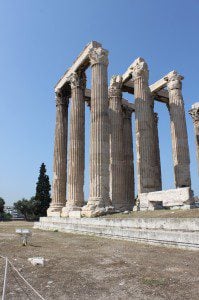
If you went to Delphi, you didn’t grab a scrying bowl and sit over the vent, you consulted the Oracle. You might bring a sacrifice to the Temple of Zeus, but the priest would actually perform the rite of sacrifice. You could certainly pray to the Gods yourself and perhaps They’d answer, but if you wanted to be sure you got an answer you’d consult that God’s priest. Priests were mediators.
If you need your car repaired you can do it yourself, but professional mechanics have the training and experience to do it better, faster, and more reliably. If you have a minor cut you can put a band-aid on it as well as anyone, but if you need a bone set or a major wound treated, you’d be better off seeing a surgeon and not trying to treat it yourself.
The Catholic idea that some things require a priest is not relevant here. But the low-church Protestant insistence that “we don’t need no stinkin’ priests” isn’t helpful either. A modern Pagan priest is not a mediator because he is pure and privileged to approach a God while others are not. A Pagan priest is a mediator because he is familiar with a God and with the best ways to communicate with that God.
Rites of ecstatic possession are literal acts of mediation. When I’ve done this, the messages have been for me, but I’ve participated in similar rituals where the deity used the priest to deliver messages to others. In less dramatic rituals, priests invoke (invite) a God into the circle, make offerings (provide hospitality), and prepare the hearts and minds of the circle to receive the blessings of the deities.
Again, it’s not that only priests can do these things. Because of their training, experience, and close relationship with the deities they serve, they can do them better and more reliably than ordinary folks.
Remember that having intimate knowledge of one deity doesn’t mean a priest will be on good terms with every deity. I’ll be happy to speak to the Forest God for you, but when I had a recent need in the realm of Gatekeeper deities, I contacted a priest who regularly works with Them.
Priests Serve Their Communities
Is serving the community part of serving the Gods or is it a goal in and of itself? Does it really matter? I once had a Methodist minister (who, while a good minister and a good person, was far from the most pious individual I’ve ever met) tell me “I serve God by serving people.” The word “priest” is virtually non-existent in the OBOD training materials, but one of the upper level lessons says “the Druid grade is in essence a grade of service.” How do priests serve their communities?
A priest serves as a teacher. He will be expected to be a subject matter expert on his religion, its history, its principles, doctrines and rituals. He should be able to explain the essence of the religion and to present it to the curious, not to proselytize but to help build an accurate understanding of it in the community and in the wider world.
A priest serves as an exemplar. He should model the behaviors and lifestyles he advocates. He is human and will not be perfect in any of this, but he should strive to live a life in alignment with his highest values and in the spirit of the Gods and Goddesses he serves. Or, to borrow a phrase from my Baptist childhood: “practice what you preach.”
A priest will be a counselor. Show a little competency in leadership and begin exemplifying the Divine to any extent and people will begin telling you more than you want to know about themselves. One of the most valuable services a priest can provide is simply to listen and be an unanxious presence.
While a proper mixture of divination, prayer, ritual, and counseling can be helpful, a priest can’t solve people’s problems for them. What he can do is to be with them and support them until they can solve their problems themselves. A priest must also recognize the limits of his expertise – is what you’re hearing a spiritual problem or is it mental illness? A priest must know when to say “I can’t help you – you need to see a mental health professional.”
A priest serves as an organizer. He should make sure the trains run on time: rituals are performed, offerings are made, classes are held, this-world actions are taken. A priest doesn’t have to do all that himself (nor should he, in most cases), but he should make sure his religious community does the things it needs to do. People can – and should, and at least occasionally – be allowed to fail. Communities can never be allowed to fail.
If someone is regularly seen as a counselor and an organizer, eventually that person becomes an authority. Many Pagans have issues with authority – a priest should expect to be challenged, and should make sure he always exercises proper authority based on legitimate expertise and the correctness of decisions. Decisions based solely on the preferences of a priest (“I’m the priest, do it my way!”) is an abuse of authority.
Application
This is how I see priesthood in a modern, Pagan, polytheistic setting. Specific traditions and deities will have specific requirements beyond, or in some cases, different from what I’ve described here. But this is what I’ve been called to do and be.
I welcome your thoughts on this – particularly those of you who are participating in the depths of commitment inherent in authentic priesthood.


